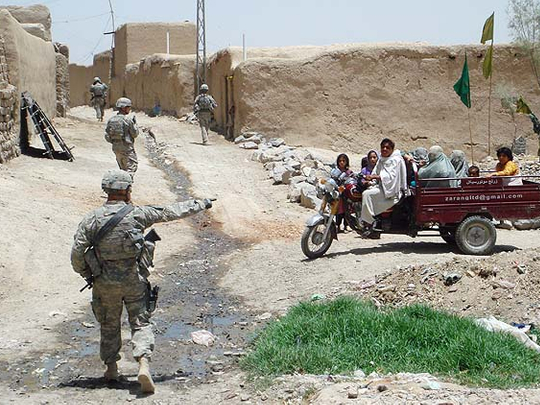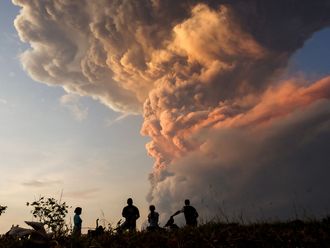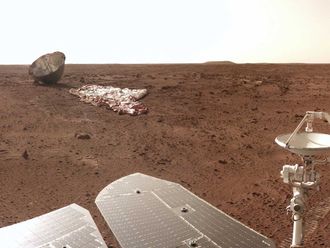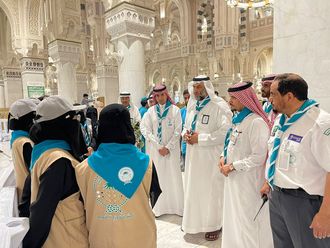
Brussels: Muslim countries should put in more efforts to achieve stability in Afghanistan and help the war-torn country move forward in the reconstruction process, North Atlantic Organisation Treaty (Nato) secretary-general has said.
"Countries with a Muslim majority can play a very strong role in Afghanistan because our Muslim partners can draw on their cultural and religious backgrounds and provide assistance that is highly appreciated by the local community," Anders Fogh Rasmussen said. "The broad variety of possibilities available include supplying soldiers, training, contributing money and helping with organising activities," he told journalists from the Arab world during an interview in Brussels.
The presence of Muslim soldiers will make it highly visible that the ongoing fight is not religiously-motivated and is not against Islam in any way, Rasmussen said.
The Nato chief dismissed doubts about the outcome of the training amid reports that several Afghani trainees deserted their camps to join Taliban forces who gave them more lucrative offers to reinforce their ranks.
"Nato's training of Afghani soldiers and police has been successful. Our plan is to train up to 300,000 Afghanis by October 2011, and right now, we are ahead of our schedule. However, we still need trainers and the training can take place inside Afghanistan or in partner countries," he said.
For Rasmussen who on August 1 will mark one year in charge of the world's largest political and military alliance, external contributions to the reconstruction effort in Afghanistan are crucial.
"There is a trust fund, and it is used for the training and the re-integration of former Afghani Taliban. Afghanistan does not have the resources and needs assistance," he said.
Muslim partner countries can also help stimulate activities thanks to their educational and cultural background, Rasmussen said.
The Nato's chief attributed the presence of the alliance in Afghanistan to madates by the United Nations.
"The US, a Nato country, was attacked in 2001, but the US went into Afghanistan with the Coalition of the Willing. It was not a Nato mission. Nato was later invited by the United Nations to help protect civilians involved in the reconstruction process and who came under attacks from Taliban. The UN subsequently asked Nato to help train Afghan military and police so that they can take up the security of their own people and country. There have been 12 UN resolutions to help with the reconstruction efforts in Afghanistan."
The Denmark-born secretary-general said that although a lot of work was needed to improve the situation in Afghanistan, there were success stories that should be highlighted.
"Despite all the negative stories coming out of Afghanistan, we have been making progress. We have rebuilt 3,500 schools and today seven million Afghanis, including three million girls, go to school. Around 25% of the people have access to health facilities, up from only 6%, and around 13,000 kilometres of roads, a crucial element in promoting mobility and economic activities, have been built. Around five million Afghani refugees have returned home," he said.
For the Nato leader, talk about an exit strategy was not an option.
"We will not leave the Afghani people behind or allow Taliban to return to power. Afghanis can rely on us and the International Security Assistance Force (ISAF) is not an occupation force," he said, referring to the Nato-led multinational force. Three Arab countries have contributed troops to the task force.
"Most Afghanis support Nato. We have decided to send in more soldiers and we are now conducting operations in Taliban heartland."
Rasmussen said that outside Afghanistan, Muslims appreciated Nato's role.
"People in Muslim countries know that if we left Afghanistan prematurely, there would be high risks and terrorism. Muslim countries have suffered from terrorism and they want to fight extremism," he said.
According to the Nato's chief, partnerships, including ones with Arab countries in the Mediterranean and in the Arabian Gulf, will hold an even higher significance in the alliance's new strategic concept to be drafted by the secretary general following extensive consultations with partners.
"Partnerships are very significant because all the countries face the same security challenges, namely terrorism, proliferation of weapons of mass destruction, piracy. Cooperation can make dealing with threats and challenges more easily," he said. "Partnerships are also significant because they are needed for security operations. Partners can provide military personnel, training, civilian reconstruction, development and humanitarian assistance," he said.
In their new strategic concept, Nato's group of experts recommended that Nato should approach its relations with its Mediterranean and Middle East with strategic patience. "The Mediterranean Dialogue (MD) and the Istanbul Conference Initiative (ICI) are still relatively new and the political discussion and practical cooperation they provide can enhance mutual understanding and contribute to stability," the group said as the alliance reviews its mission statement for the years to come. Bahrain, Kuwait, Qatar and Oman have joined the ICI.
Nato officials said that they would look at any threat to Arabian Gulf stability and security.
According to a Nato official, the trans-Atlantic alliance is not the world's policeman. "Nato is a regional alliance. However, threats are becoming increasingly global and when they affect a member country, Nato is prompted into action," the official said. "Nato does not have the vocation to be a global policeman because there is no consensus for that among Nato countries and because the alliance does not have the resources to deal with all crises."
However, the official said that Nato was like an umbrella that people carry with them. "We all hope to have sunny weather all the time, but if there is rain, you must have an umbrella on hand to deal with the situation," he said. "Uncertainty is the top enemy."











